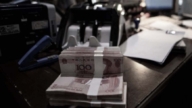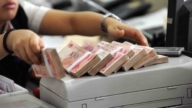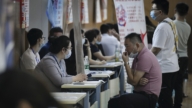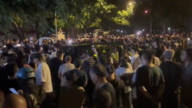【新唐人2014年03月01日訊】人民幣兌美元上個月突破6.04,創了歷史新高,正當人們期待「破六」時,人民幣匯率開始了狂跌。短短10個交易日,人民幣對美元中間價跌至6.165093,跌幅超過了2%,而去年全年人民幣漲幅也僅有2.9%。處在狂降時期的人民幣,是否是安全的投資幣種?請看報導。
對於近期狂跌的人民幣,27號,美國的《華爾街日報》引述熟悉中國央行人士的話表示,央行主導了近期人民幣的下跌,目地是讓投機者出局。
《華爾街日報》還根據交易員們的消息說,央行還指示國有銀行買入美元,以此干預外匯市場。
《華爾街日報》的報導並不是空穴來風。
在2月16號,中共央行召開了為期兩天的人民幣業務會議,會後央行發佈一則聲明:央行決定打擊人民幣單邊升值的預期,抑制投機交易。
在會議結束後的第二天,也就是2月19號,人民幣開始了這輪的狂降。
港媒指出,19號早盤交易中曾有至少兩家中資大行出價購入買美元,使美元價格急升。
大陸金融分析師任中道:「中共一直在操縱匯率,央行每天給一個參考匯率,然後每天跌幅不超過1%。其實匯率的漲和跌完全處於中共的手裡面,它可以來控制這一切。」
其實,早在2012年,約三個月內,中共央行也把人民幣貶值1.5%左右。
不過,根據外匯局最新公布的統計資料顯示,今年1月份,銀行結匯達到12412億元人民幣,等值2033億美元,售匯為7937億元人民幣,等值1300億美元,結售匯順差達4475億元人民幣,等值733億美元,環比大增1.3倍。
這說明1月份仍有大量熱錢流入。
而非盈利研究機構全球金融誠信(Global Financial Integrity)的研究顯示,去年有接近1000億美元資金,通過偽造出口發票,潛入中國,這些資金進入中國後流向高息貸款、房地產等領域。
美國「南卡羅萊納大學艾肯商學院」教授謝田認為,目前房地產的升幅還是遠大於匯率的貶值。去年,中國的平均房價上漲了9.5%,所以,只要房地產的泡沫不滅,熱錢仍有套利的空間。
美國南卡羅萊納大學艾肯商學院教授謝田:「而實際上這些熱錢本身,我們知道很多是中共自己的錢,中共權貴自己的錢在轉了一圈又流回來。」
謝田指出,長久來看,房地產泡沫一定會破滅。一旦破滅,人民幣大幅度貶值就無法避免。
《華爾街日報》還報導說,目前中共正計劃改革金融業,提升人民幣的地位以挑戰國際貨幣美元,而匯率市場化改革是計劃的一部分。
報導還引述熟悉央行人士的話說,央行正試探市場,以便為放寬人民幣交易區間做準備。並預計今年央行允許人民幣每日在中間價上下各2%的範圍內波動。
目前央行規定人民幣每日波動範圍為中間價上下各1%。
謝田:「只要中共還在掌權、在控制中國一天,恐怕就不會讓人民幣自由浮動。就像也不會讓這些土地、國有資產回到老百姓手中一樣。」
謝田指出,中共是靠謊言和暴力起家,現在是靠謊言和暴力來維持。所以,中共一旦對金融市場、對貨幣、對土地財政失去控制的話,它們的統治就維持不下去。
不過,對人民幣這次大跌還有不同的看法。
總部位於美國紐約的「高盛集團」,在2月21號發佈的一份報告中指出,「鬼城、地方債、信託危機」,是導致這次人民幣大跌的原因。
今年以來,江蘇常州、浙江杭州等地不少樓房大幅降價,最近更傳出上海有超過6成的樓房降價,有的還9折優惠,折扣幅度遠遠超過去年。
有人說,聽到了房市「崩盤」的聲音。
中國經濟趨勢研究專家時寒冰早前就警告說,假設人民幣幣值穩定,房價必然下跌。但是,人民幣可能在未來出現崩潰性貶值,房價的漲跌就顯得不重要了。
時寒冰預計人民幣和美元的匯率將降到1:20以上。
採訪/易如 編輯/宋風 後製/黎安安
Huge Slump Questions Safety in China’s Currency
China’s currency the Yuan, also called the Renminbi (RMB),
hit a historical low of 6.04 against one dollar last month.
However, the Yuan suddenly started to fall when people
expected the exchange rate to drop below 6.
Just in ten business days, the Yuan has fallen fell by more
than 2% to 6.165093 against one US dollar, noting that China’s
currency only rose by 2.9% during the whole year of 2013.
Is the Yuan still a safe currency for investment after
such a huge slump?
Let’s look at the following report.
On Feb 27, the Wall Street Journal (WSJ) commented on
the recent plunge of China’s Yuan.
The WSJ quoted a resource that it was China’s Central Bank
that “engineered the recent decline" in its currency,
such as to “thwart short-term speculators".
WSJ also said, that the Chinese Communist Party (CCP)
“intervened in the currency market by directing state-owned
Chinese banks to buy US dollars", according to traders.
WSJ’s report is not groundless at all.
On Feb 16, the CCP’s Central Bank held a two-day meeting
over its currency, Yuan business.
The Central Bank announced after the meeting that, it had
decided to beat expectations of unilateral appreciation
in Yuan, such as to suppress speculations.
On the 19th, the second day after the meeting, the Yuan
started the current round of plunging.
Hong Kong media reported that, in morning trades on the 19th,
at least two big Chinese banks bought US dollars, consequently
resulting in a sudden rise in the dollar.
Ren Zhongdao, Chinese Financial Analyst: The party is
always controlling the exchange rate.
Its Central Bank provides a reference value to prevent daily
decline from exceeding 1%.
But indeed the CCP have complete control
over the exchange rate.
It can make it rise or fall whenever it wants.
The truth is, as early as in 2012, the CCP’s Central Bank
had intentionally depreciated the Yuan by about 1.5%.
On the other hand, latest statistics by the CCP’s Foreign
Exchange Administration show that, the total settlement
in exchange by Chinese banks reached 1.2412 trillion
Yuan ($US 203.3 billion) in January 2014.
During the same period, the total sale in exchanging currency
is 793.7 billion Yuan ($US 130 billion).
The balance is 447.5 billion Yuan ($US 73.3 billion),
1.3 times that of last month.
Those facts clearly indicate that hot money continued to flow
into China in January.
A non-profit research institution, Global Financial Integrity
reported that nearly 100 billion dollars flew into China
in forms of forged export invoices during 2013.
That money was mostly used in fields such as high-interest
loans and real estate investment.
Xie Tian, Professor at University of South Carolina,
commented that the level of price rises in China’s real estate
market is far more than that in exchange rate drop.
During 2013, China’s average house price increased by 9.5%.
Therefore as long as China’s real estate bubble does not
burst, there is still space for hot money to make a profit.
Xie Tian, Professor at Aiken Business School, University
of South Carolina:" In fact we know that a large fraction
of that hot money is from the CCP itself.
The party bigwigs circulate their money bank to China."
Xie Tian said, China’s housing bubble will definitely burst
in a long-term view.
Once that occurs, a consequent huge slump in
the Yuan is unavoidable.
WSJ’s report also mentions that, the CCP is currently
planning for financial reform.
The goal is to elevate the Yuan to “rival the U.S. dollar for
supremacy on the world stage".
The exchange-rate reform is part of that plan.
The report quoted sources familiar to the CCP’s Central Bank
that the People’s Bank of China (PBOC) is “testing the market
as it prepares to widen the Yuan’s trading band".
Analysts expect that the PBOC will allow its currency to
move up or down by 2% daily this year.
Currently, the PBOC only allows the Yuan’s value to move
by 1% in either direction from its average price
in daily trading.
Xie Tian: As long as the CCP still governs China, it probably
will never allow the currency to move freely.
Similarly, they will never return land and state-owned
properties to the Chinese people.
Xie Tian commented that the CCP took power with lies
and violence back in history and now tries to maintain
its regime with the same means.
Therefore, it can hardly keep its governance once losing
control over the financial market, currency and land trade.
On the other hand, there are different opinions
on the big drop in Yuan.
The New York-based Goldman Sachs Group released
a report on Feb 21.
The report said, “Ghost towns, local debts and trust
sector crisis" caused the slump in Yuan.
Since this year, housing price jumps were seen in places such
as Changzhou in Jiangsu and Hangzhou in Zhejiang.
There were even recent reports saying over 60% of housing
prices in Shanghai had dropped.
The discounts reached 10% in some places, a level
far beyond that in 2013.
Some people said they had heard “sounds of collapse"
in China’s housing market.
Shi Hanbing, a senior researcher in China’s economic trend,
had warned that a stable exchange rate in Yuan would
unavoidably lead to drop in housing prices.
However, if the Yuan suffers a devastative depreciation
in the future, the change in housing prices will no
longer be revelant.
Shi Hanbing estimated that, the Yuan will eventually fall to
over 20 against the US dollar.
Interview/Yi Ru Edit/Song Feng Post-Production/Li An’an






























